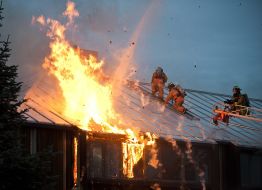House fires are a very traumatic incident and create a lot of stress and work afterwards when trying to deal with the cleanup, restoration, or rebuilding of the house. After a fire has ravaged a home, the homeowner is the one that is ultimately responsible for the clearing of the debris and its safe disposal. Handling this task alone can be very difficult, if not impossible, so it’s often best to call in a professional fire debris removal company. You can do your own research to find a suitable company or ask your insurer who they would recommend.
Fire Debris Removal
Fire debris removal in general is just the process of removing all the fire damaged debris from a home after a house fire. This process begins almost immediately after the fire department has deemed the home safe enough to enter again, and after the insurance company is called. Luckily for most that have home insurance, fire debris removal costs are covered under the insurance policy (but it is always good to double check, especially before a disaster.)
Fire debris removal is more involved than just throwing items into the trash because of the extent of damage that has been done to the home. Odors, soot, and fire can leave extensive damage that results in needing to remove most items from a home, and if they cannot be restored, they must be disposed of in an environmentally safe manner. This is where site clearing professionals come in, as they have the proper training to be able to identify debris that cannot be restored and they have the equipment and transportation to safely handle contaminated debris and dispose of it safely at the appropriate facilities for the homeowner.
What Needs to Be Thrown Out
After calling the insurance agent, and getting a fire debris removal team on site, an inspection and assessment will be done on the home. Through this inspection, it will be determined what needs to be removed, and what can be restored as is. This inspection is very important, as damage could be hidden behind walls, or in places a homeowner may not expect. After a fire, excessive amounts of smoke and water damage, may result in a lot of items in the home having to be thrown out, as soot is a very tiny particle, and can often not be fully cleaned out of an object. Smaller possessions are often able to be saved if they haven’t been damaged by heat or water, but larger textiles and furniture may need to be thrown out just to be on the safe side.
Foods are also a commonly tossed with fire debris removal, as smoke, soot and other toxins can contaminate even sealed foods. Anything within a sealed fridge that wasn’t damaged by heat or water can be saved however, if the fridge hasn’t been off for longer than four hours. Medicine should be disposed of properly if contaminated, and a pharmacist contacted to get them replaced.
Proper Disposal of Fire Debris
After a house fire, not everything that is removed from the house for disposal should go straight to a landfill. Houses have a lot of chemicals within them that are hazardous, although normally they are part of household goods and furniture in a safe manner. But, once damaged by a fire, these chemicals are released and become environmentally unsafe. A homeowner that doesn’t use a fire removal service may not understand this, so they should always be using a fire debris removal professional to ensure that any fire debris removed is sent to the proper facilities for processing.
Restoring What Can Be Restored
Most fire debris removal companies are also remediation and restoration specialists. This means that a homeowner that has items that can be saved, can possibly use the same company to professionally restore items so that they don’t have to be tossed. This can be particularly helpful for restoring sentimental items that cannot be replaced in a store. Inquire with your selected company to see the full range of their services.
In the end, with so much to deal with for a homeowner following a fire, it is always best to take advantage of professional fire debris removal services to take on the burden of safely removing debris that cannot be saved. Since these services are often covered by insurance plans anyways, the extra hands, and the professional knowledge can be invaluable.
